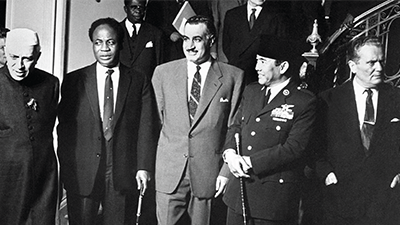Setting the Stage for the Cold War and Decolonization
Driving Question: What historical factors after 1945 contributed to the emergence of the Cold War?
The Cold War and decolonization were two events tangled together in a intricate web of economics, conflict, diplomacy, and espionage. The Cold War was a global struggle between the capitalist United States and the communist Soviet Union. This overview lesson introduces you to the ways that people and governments tried to reshape the global order after the Second World War.
Learning Objectives
- Explain the historical context of the Cold War after 1945.
- Analyze historical imagery to make predictions about the Cold War.
Vocab Terms:
- Cold War
- dependency
- ideological
- nationalize
- non-alignment
- propaganda
- superpower
Opener: Setting the Stage for the Cold War and Decolonization
To teach this lesson step, refer to page 3 of the Lesson 8.1 Teaching Guide.
Looking to make this cold war lesson less US Centric? Take a look at the Community thread Global Perspectives of the Cold War.
Propaganda is one of the most effective tools to shape public opinion—but how do we recognize it when we see it?
Poster Preview Slideshow
Devastation of Old Markets
To teach this lesson step, refer to page 3 of the Lesson 8.1 Teaching Guide.
Amid the Cold War, there was a great disparity between wealthy and struggling nations. But what led to this inequality?
-
Guiding Questions
-
Before you read
Preview the questions below, and then skim the article. Be sure to look at the section headings and any images.
While you read
Look for answers to these questions:
- Why did the United States launch the Marshall Plan?
- The article cites two arguments about the “economic miracles” in Germany and Japan. What are the two arguments?
- Why were former imperial nations often able to continue exploiting their previous colonies even after independence?
- How did some African and Asian leaders fight back against this sort of dependency?
- Who did not share in the new economic prosperity in the United States?
After you read
Respond to the following questions:
- Using evidence from this article, explain the historical context of the Cold War after 1945.
- Why is it helpful to contextualize the Cold War and decolonization within the global economic situation at the end of the Second World War and in the decade that followed?
Closer: Setting the Stage for the Cold War and Decolonization
To teach this lesson step, refer to page 4 of the Lesson 8.1 Teaching Guide.
Curious about what other teachers are doing with maps? The Community thread How do you use maps in your classroom? has great ideas!
The origins of the Cold War revolve around two opposed ideologies. Can you tell what’s capitalism and what’s communism?















